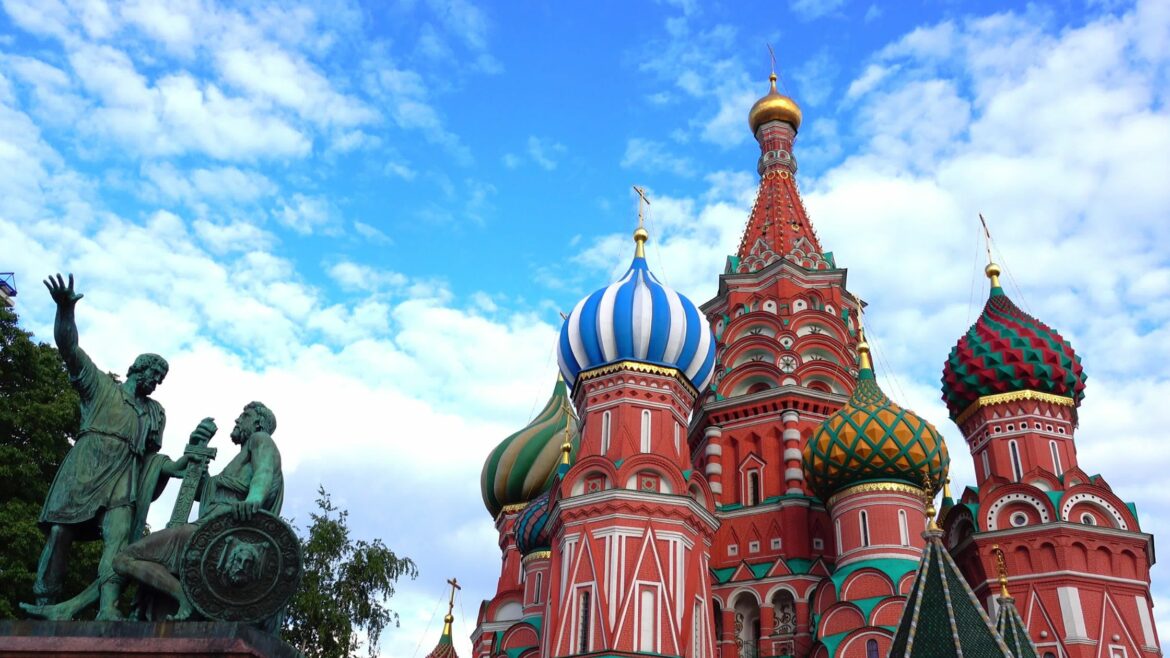Formerly part of the Soviet Union, Russia or the Russian Federation is a popular outsourcing destination because of its low average salary — compared to countries like the UK, Switzerland, or the USA.
The average annual salary in Russia is 1,240,000 Rubles (RUB) or USD 14,771 (according to the exchange rate in June 2023).
In this article, we’ll explore the average salary in Russia and compare it with that of the US. We’ll also cover why Russia is a suitable outsourcing destination for most businesses.
Table of Contents
- What is the average salary in Russia?
- Average salary comparisons of Russia and USA
- Is Russia a suitable outsourcing location?
- 2 prominent outsourcing industries in Russia
Let’s dive in.
What is the average salary in Russia?
A country’s average salary is the average remuneration the employed citizens receive for their work. In addition to monetary compensation, the average salary also includes benefits that employees get like housing, transport, medical insurance, etc.
According to Salary Explorer, the average salary ranges from 26,200 RUB (lowest average) to 463,000 RUB (highest average) in Russia.
The average hourly wage in Russia is 600 RUB or USD 7.15 (US Dollars), and the minimum wage is 16,242 RUB per month (USD 194).
Russia has a median salary of 94,900 RUB per month (USD 1,130). This means that half of the population earns less than 94,900 RUB while the other half earns more than 94,900 RUB.
However, these figures vary according to occupation, experience, and other factors.
Let’s look at the factors that influence the average salary in Russia:
A. Education
Based on education, Russian employees with a Master’s degree earn 29% more than those with a Bachelor’s Degree. Similarly, employees with a Doctorate Degree generally earn 23% more than Master’s Degree holders while doing the same job.
B. Experience
Employees who have two to five years of experience get around 32% more than their inexperienced counterparts. And those with more than five years of experience are paid 36% more than those with five or lesser work experience.
Gradually, the salary increases by 21% for employees with ten years of experience and 14% for those who have crossed the 15 years mark.
C. Location
The average income differs from one Russian city to another. This is because of the varying resource distribution and climatic conditions across the nation.
Like Omsk and Tomsk, some cities have oil reservoirs that attract petroleum companies from across the world. Others like Norilsk have icy climates and are challenging to inhabit.
Typically, the salaries in cities with oil, gas, and raw material extractive industries are more due to higher revenue. The high salaries in such regions compensate for the harsh climate, remote location, and high local prices.
Here’s the average monthly salary of a few major cities:
| City | Average Monthly Salary (in Russian Rubles) |
| Moscow | 124,000 RUB (highest average salary) |
| St. Petersburg | 122,000 RUB |
| Chukotka | 116,400 RUB |
| Chelyabinsk | 114,000 RUB |
| Omsk | 112,000 RUB |
| Samara | 107,000 RUB |
| Volgograd | 93,900 RUB |
| Saratov | 90,300 RUB |
| Tomsk | 42,666 RUB |
| Murmansk | 40,000 RUB |
| Dagestan | 29,000 RUB |
| Pskov | 25,925 RUB |
Source: salaryexplorer.com, tellerreport.com, numbeo.com
D. Increments
Russian employees are likely to obtain an 8% increase in their monthly earnings every 17 months. Citizens working in the banking, energy, and IT fields get the highest salary hikes.
Interestingly, this figure is higher than the percentage of global average salary increments, which is only 3% in 16 months.
E. Profession
Software development engineers have the highest salary, with an average income of 179,000 RUB per month (USD 2,132).
They’re followed closely by accountants with 152,000 RUB/month (USD 1,811).
Other common occupations like customer service agents generally receive a decent income of 71,100 RUB/month (USD 847). An administrative manager is paid 114,000 RUB/month (USD 1,358) on average monthly.
Note: The figures provided in this article can vary based on several factors and should only be taken as general guidelines.

Average salary comparisons of Russia and USA
As you can see, the average Russian salary is only $1,239 a month — which is lower than that in the USA (USD 4,326).
But to understand Russian citizens’ lifestyle, you need to look at their PPP (Purchasing Power Parity) and GDP (Gross Domestic Product):
- PPP is an economic theory that compares the purchasing power of various world currencies to one another.
- GDP is the monetary value of all final goods and services produced in a country during a period. When you calculate GDP based on PPP, you can easily compare the cost of utilities and salaries in two countries.
The PPP of Russia is 2.6 times that of the USA and 165% of the world. This means that things that cost USD 1 in Russia will usually cost USD 2.6 in the USA.
Due to high PPP, the Russian employees are willing to work for lower salaries. Additionally, higher education (in public institutions) and healthcare are also free.
But are Russians satisfied with their income?
Is Russia a suitable outsourcing location?
According to Statista, the Russian outsourcing industry had a turnover of 51.09 billion RUB (USD 0.68 billion) in 2018.
We have already seen that salaries are relatively low in Russia, making it a popular outsourcing destination. Apart from that, Russia has several other benefits for outsourcers.
Let’s look at a few of them:
1. Low outsourcing cost
The outsourcing cost in Russia is much less than that in the US or other European countries.
You can even outsource to a city with low salary expectations like Pskov and further enhance your bottom line.
Moreover, the labor cost varies depending on whom you outsource to and the nature of the job.
A moderately experienced programmer in Russia is paid around USD 25 per hour for outsourced work, whereas a senior programmer receives around USD 30 per hour.
Additionally, you can set up and run an office at a lower cost in Russia as the cost of resources like infrastructure, water, and electricity are low.
2. High number of qualified professionals
Russia has a vast talent pool due to its strong education system. As a result, you can hire from a highly qualified human resource management company at low labor costs if you outsource to Russia.
Coursera’s Global Skills Report gave Russia the top rank in technology and data science. And Forbes published that Russian is home to the most engineering graduates in the world in 2015.
Besides having some of the best engineers in the world, the country also has a huge number of IT professionals.
HackerRank, a technical assessment solution for developers, published that Russia has the most skilled hackers in the world. It also found out that the developers in Russia ranked second best after developers in China.
3. Time zone differences
Incompatible time zones can disrupt collaboration between the teams and delay work completion.
The territory of Russia has eleven time zones ranging from GMT +02:00 to GMT +12:00 — and this can benefit you.
Typically, the time difference delays work completion in outsourcing. However, you can take advantage of the time difference to get work done quicker.
How?
By having your Russian team handle work during your non-working hours.
For example, you can outsource a task at the end of your working day to a company that’s just starting its day. If it’s a small task, your partner can submit it on the day.
4. Stable economic and political environment
Your outsourcing partner will mostly break off contracts with its clients when their country faces political and economic instability. Such disruption in the outsourcing relationship can delay the delivery of products and services, causing you monetary loss.
Russia has a stable and healthy economy that has recovered quickly after challenges like the Recession (2007-2009) and the Coronavirus pandemic.
According to Rosstat (Federal State Statistics Service), Russia’s GDP growth fell by 3.1% during the pandemic compared to the world’s 3.8%. These statistics show that the Russian economy is stronger than most other countries.
Additionally, the World Bank forecasted that Russia would grow by 3.2% in 2021, followed by 3.2% and 2.3% in 2022 and 2023, respectively.
So outsourcing to a largely stable country like Russia could lead to a long-lasting outsourcing relationship.
2 prominent outsourcing industries in Russia
Here’s a list of the most promising industries that you can consider outsourcing to Russia for:
1. Customer support
Russia is a popular customer support outsourcing destination since the country offers professional and multi-lingual customer service at a low cost.
Major industries that outsource customer support to Russia are IT and telecom, BFSI, healthcare, and retail.
Russian customer support companies offer services like:
- Appointment setting.
- Order taking and tracking.
- Credit card processing.
- Reservation services.
2. Information technology (IT)
The Russoft Association reported that IT outsourcing to Russia amounted to USD 5.3 billion in 2018. Additionally, it projected that the revenue in the BPO (Business Process Outsourcing) sector would reach USD 3.9 billion in 2020.
The most preferred IT destinations in the country are:
- Moscow
- St. Petersburg
- Novosibirsk
- Omsk
- Chelyabinsk
- Ulyanovsk
Wrapping up
Russia is undoubtedly a good outsourcing destination, primarily because of its low average wage.
You can refer to the information in this article to develop a better understanding of outsourcing and expected labor costs in Russia. It can also help you gain better insight into the Russian economy and the benefits of outsourcing to the country.

Andy is a technology & marketing leader who has delivered award-winning and world-first experiences.


